知识点
- 格式:docx
- 大小:89.07 KB
- 文档页数:18
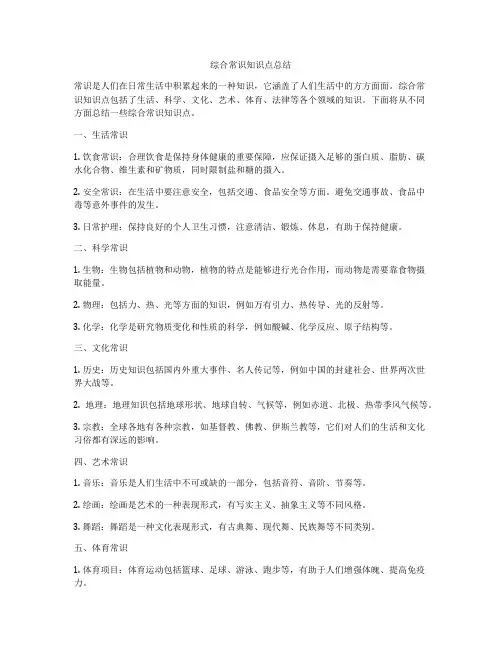
综合常识知识点总结常识是人们在日常生活中积累起来的一种知识,它涵盖了人们生活中的方方面面。
综合常识知识点包括了生活、科学、文化、艺术、体育、法律等各个领域的知识。
下面将从不同方面总结一些综合常识知识点。
一、生活常识1. 饮食常识:合理饮食是保持身体健康的重要保障,应保证摄入足够的蛋白质、脂肪、碳水化合物、维生素和矿物质,同时限制盐和糖的摄入。
2. 安全常识:在生活中要注意安全,包括交通、食品安全等方面。
避免交通事故、食品中毒等意外事件的发生。
3. 日常护理:保持良好的个人卫生习惯,注意清洁、锻炼、休息,有助于保持健康。
二、科学常识1. 生物:生物包括植物和动物,植物的特点是能够进行光合作用,而动物是需要靠食物摄取能量。
2. 物理:包括力、热、光等方面的知识,例如万有引力、热传导、光的反射等。
3. 化学:化学是研究物质变化和性质的科学,例如酸碱、化学反应、原子结构等。
三、文化常识1. 历史:历史知识包括国内外重大事件、名人传记等,例如中国的封建社会、世界两次世界大战等。
2. 地理:地理知识包括地球形状、地球自转、气候等,例如赤道、北极、热带季风气候等。
3. 宗教:全球各地有各种宗教,如基督教、佛教、伊斯兰教等,它们对人们的生活和文化习俗都有深远的影响。
四、艺术常识1. 音乐:音乐是人们生活中不可或缺的一部分,包括音符、音阶、节奏等。
2. 绘画:绘画是艺术的一种表现形式,有写实主义、抽象主义等不同风格。
3. 舞蹈:舞蹈是一种文化表现形式,有古典舞、现代舞、民族舞等不同类别。
五、体育常识1. 体育项目:体育运动包括篮球、足球、游泳、跑步等,有助于人们增强体魄、提高免疫力。
2. 运动技巧:不同的体育项目有不同的技巧,需要通过练习来掌握。
3. 运动装备:不同的体育项目需要不同的装备,如球类、网球拍、游泳镜等。
六、法律常识1. 法律意识:人们在日常生活中需要遵守法律法规,不得违反。
2. 交通法规:驾驶者需要了解交通法规,遵守交通规则,保护自己和他人的安全。
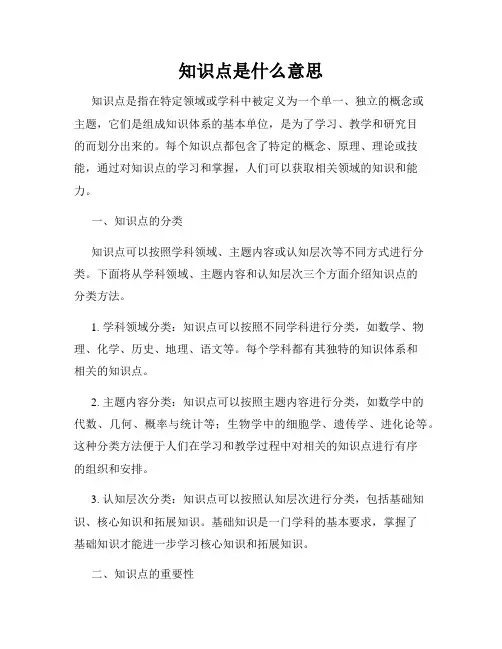
知识点是什么意思知识点是指在特定领域或学科中被定义为一个单一、独立的概念或主题,它们是组成知识体系的基本单位,是为了学习、教学和研究目的而划分出来的。
每个知识点都包含了特定的概念、原理、理论或技能,通过对知识点的学习和掌握,人们可以获取相关领域的知识和能力。
一、知识点的分类知识点可以按照学科领域、主题内容或认知层次等不同方式进行分类。
下面将从学科领域、主题内容和认知层次三个方面介绍知识点的分类方法。
1. 学科领域分类:知识点可以按照不同学科进行分类,如数学、物理、化学、历史、地理、语文等。
每个学科都有其独特的知识体系和相关的知识点。
2. 主题内容分类:知识点可以按照主题内容进行分类,如数学中的代数、几何、概率与统计等;生物学中的细胞学、遗传学、进化论等。
这种分类方法便于人们在学习和教学过程中对相关的知识点进行有序的组织和安排。
3. 认知层次分类:知识点可以按照认知层次进行分类,包括基础知识、核心知识和拓展知识。
基础知识是一门学科的基本要求,掌握了基础知识才能进一步学习核心知识和拓展知识。
二、知识点的重要性知识点作为学习和教学的基本单位,具有以下重要性:1. 有效组织学习:知识点将复杂的学科知识划分为单一的、独立的概念或主题,使学生能够有针对性地进行学习和理解。
通过对知识点的学习,学生可以逐步积累、扩展和深化自己的知识体系。
2. 便于教学管理:知识点的划分和组织使教师在教学中更加有针对性和有计划性。
教师可以按照不同的知识点进行教学内容的组织,帮助学生更好地理解和掌握知识。
3. 促进学科研究:知识点为学科研究提供了基本单位。
通过对知识点的深入研究,可以发现新的规律、提出新的理论,并为学科的发展做出贡献。
三、如何学习知识点为了有效地学习知识点,以下是一些建议和方法:1. 理解概念和原理:在学习知识点时,首先要理解其中的概念和原理。
可以通过参考教材、查阅相关资料或请教老师来加深对概念和原理的理解。
2. 运用知识点:学习知识点的目的不仅仅是为了记忆和理解,更重要的是能够运用所学的知识点解决问题。
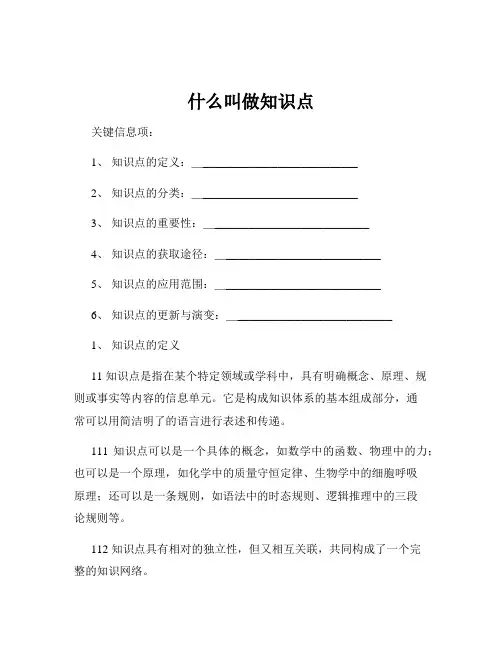
什么叫做知识点关键信息项:1、知识点的定义:____________________________2、知识点的分类:____________________________3、知识点的重要性:____________________________4、知识点的获取途径:____________________________5、知识点的应用范围:____________________________6、知识点的更新与演变:____________________________1、知识点的定义11 知识点是指在某个特定领域或学科中,具有明确概念、原理、规则或事实等内容的信息单元。
它是构成知识体系的基本组成部分,通常可以用简洁明了的语言进行表述和传递。
111 知识点可以是一个具体的概念,如数学中的函数、物理中的力;也可以是一个原理,如化学中的质量守恒定律、生物学中的细胞呼吸原理;还可以是一条规则,如语法中的时态规则、逻辑推理中的三段论规则等。
112 知识点具有相对的独立性,但又相互关联,共同构成了一个完整的知识网络。
2、知识点的分类21 按照学科领域分类,知识点可以分为数学知识点、语文知识点、英语知识点、物理知识点、化学知识点、生物知识点等。
每个学科都有其独特的知识点体系。
211 在数学学科中,知识点包括代数、几何、概率统计等方面的内容;语文知识点涵盖了字词、语法、修辞、文学常识等;英语知识点包含词汇、语法、听力、阅读、写作等。
22 按照知识的性质分类,知识点可以分为理论性知识点和实践性知识点。
221 理论性知识点侧重于阐述概念、原理和规律,是对事物本质的抽象概括;实践性知识点则更注重实际操作和应用,如实验技能、解决问题的方法等。
23 按照知识的难易程度分类,知识点可以分为基础知识点、中级知识点和高级知识点。
231 基础知识点是学习和掌握一个学科的起点,是构建知识大厦的基石;中级知识点在基础知识点的基础上进一步深化和拓展;高级知识点则往往具有较高的专业性和综合性。
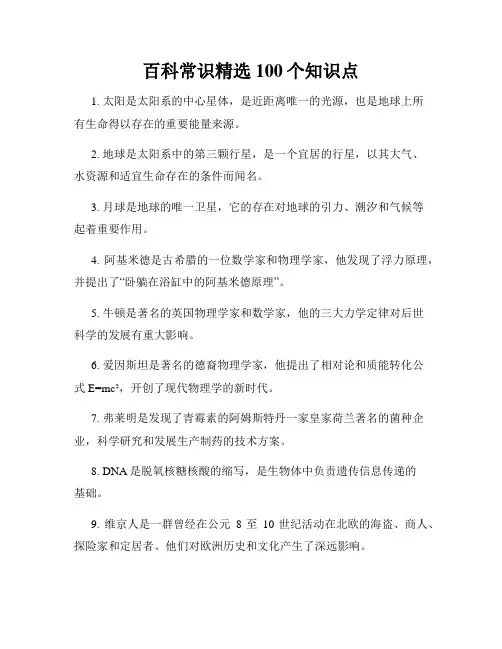
百科常识精选100个知识点1. 太阳是太阳系的中心星体,是近距离唯一的光源,也是地球上所有生命得以存在的重要能量来源。
2. 地球是太阳系中的第三颗行星,是一个宜居的行星,以其大气、水资源和适宜生命存在的条件而闻名。
3. 月球是地球的唯一卫星,它的存在对地球的引力、潮汐和气候等起着重要作用。
4. 阿基米德是古希腊的一位数学家和物理学家,他发现了浮力原理,并提出了“卧躺在浴缸中的阿基米德原理”。
5. 牛顿是著名的英国物理学家和数学家,他的三大力学定律对后世科学的发展有重大影响。
6. 爱因斯坦是著名的德裔物理学家,他提出了相对论和质能转化公式E=mc²,开创了现代物理学的新时代。
7. 弗莱明是发现了青霉素的阿姆斯特丹一家皇家荷兰著名的菌种企业,科学研究和发展生产制药的技术方案。
8. DNA是脱氧核糖核酸的缩写,是生物体中负责遗传信息传递的基础。
9. 维京人是一群曾经在公元8至10世纪活动在北欧的海盗、商人、探险家和定居者。
他们对欧洲历史和文化产生了深远影响。
10. 高尔夫球是一种在室外草坪上进行的球类运动,其目标是将球放入球洞中,运动员要使用不同的球杆击球。
11. 琵琶是古代中国的传统乐器之一,它有四根弦、八个品位,以其独特的音色和优美的演奏技巧而受到广泛喜爱。
12. 苹果是一种常见的水果,有很多品种,常见的有苹果、红苹果、青苹果等。
13. 地震是地壳发生的破裂和移动造成的振动,可以造成地面摇晃、建筑倒塌等严重灾害。
14. 气候是指长期的天气模式,包括温度、湿度、降水量等因素,对人类生活和生态系统有重要影响。
15. 香港是中国的一座特别行政区,以其独特的历史、文化和经济发展而闻名于世。
16. 经济是一个国家或地区生产、分配和消费资源的方式和规律的总和,是社会发展的重要指标之一。
17. 足球是一种受欢迎的体育运动,它需要两个团队在一个有球门的草坪上用脚射入球门。
18. 寿司是日本的一种传统食品,其主要食材是米饭和生鱼片,通过卷、揉、切等手法制作而成。
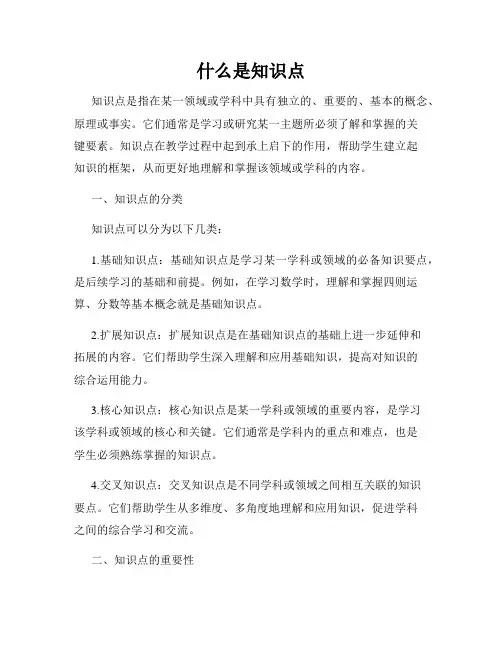
什么是知识点知识点是指在某一领域或学科中具有独立的、重要的、基本的概念、原理或事实。
它们通常是学习或研究某一主题所必须了解和掌握的关键要素。
知识点在教学过程中起到承上启下的作用,帮助学生建立起知识的框架,从而更好地理解和掌握该领域或学科的内容。
一、知识点的分类知识点可以分为以下几类:1.基础知识点:基础知识点是学习某一学科或领域的必备知识要点,是后续学习的基础和前提。
例如,在学习数学时,理解和掌握四则运算、分数等基本概念就是基础知识点。
2.扩展知识点:扩展知识点是在基础知识点的基础上进一步延伸和拓展的内容。
它们帮助学生深入理解和应用基础知识,提高对知识的综合运用能力。
3.核心知识点:核心知识点是某一学科或领域的重要内容,是学习该学科或领域的核心和关键。
它们通常是学科内的重点和难点,也是学生必须熟练掌握的知识点。
4.交叉知识点:交叉知识点是不同学科或领域之间相互关联的知识要点。
它们帮助学生从多维度、多角度地理解和应用知识,促进学科之间的综合学习和交流。
二、知识点的重要性知识点对学习和思考具有重要意义:1.指导学习:知识点是学习的目标和导引,它们帮助学生了解学习内容的重点和要点,明确学习的方向和目的。
2.提供框架:知识点对学科知识进行了归纳和总结,为学生建立起学科知识的框架,帮助学生整体把握学科的结构和内在逻辑。
3.加深理解:知识点有助于学生深入理解和掌握知识,使抽象的概念和原理变得具体、形象,增强学生的学习兴趣。
4.提高应用能力:通过掌握知识点,学生可以将其应用于解决问题、分析情况、推理推断等实际情境中,提高学科知识的实际运用能力。
5.促进思考:知识点可以引发学生的思考和探究,帮助学生形成独立思考、主动学习的能力,培养学生的创新精神和批判思维。
三、如何有效掌握知识点1.理清逻辑关系:学生应该理清知识点之间的逻辑关系,了解它们的先后顺序、因果关系和相互联系,帮助构建知识的脉络。
2.多维角度思考:学生应该从不同的角度和层面来思考和理解知识点,找出它们的内在联系和应用场景,培养多角度思考的能力。
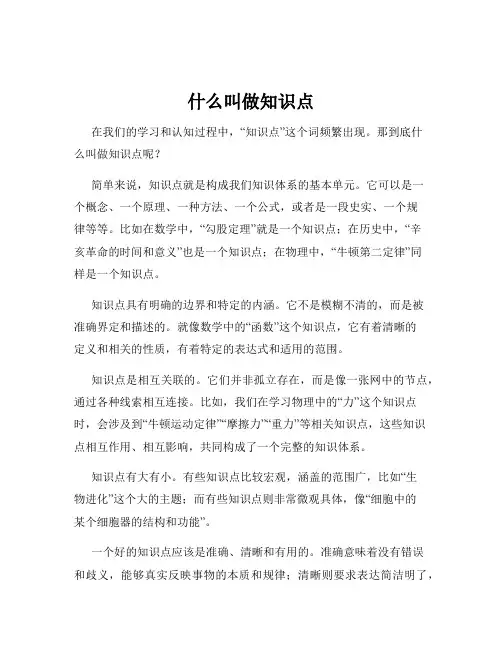
什么叫做知识点在我们的学习和认知过程中,“知识点”这个词频繁出现。
那到底什么叫做知识点呢?简单来说,知识点就是构成我们知识体系的基本单元。
它可以是一个概念、一个原理、一种方法、一个公式,或者是一段史实、一个规律等等。
比如在数学中,“勾股定理”就是一个知识点;在历史中,“辛亥革命的时间和意义”也是一个知识点;在物理中,“牛顿第二定律”同样是一个知识点。
知识点具有明确的边界和特定的内涵。
它不是模糊不清的,而是被准确界定和描述的。
就像数学中的“函数”这个知识点,它有着清晰的定义和相关的性质,有着特定的表达式和适用的范围。
知识点是相互关联的。
它们并非孤立存在,而是像一张网中的节点,通过各种线索相互连接。
比如,我们在学习物理中的“力”这个知识点时,会涉及到“牛顿运动定律”“摩擦力”“重力”等相关知识点,这些知识点相互作用、相互影响,共同构成了一个完整的知识体系。
知识点有大有小。
有些知识点比较宏观,涵盖的范围广,比如“生物进化”这个大的主题;而有些知识点则非常微观具体,像“细胞中的某个细胞器的结构和功能”。
一个好的知识点应该是准确、清晰和有用的。
准确意味着没有错误和歧义,能够真实反映事物的本质和规律;清晰则要求表达简洁明了,让人容易理解和接受;有用则是指这个知识点能够帮助我们解决实际问题,或者在理解和探索世界的过程中发挥作用。
知识点的获取途径多种多样。
我们可以通过阅读书籍、聆听讲座、观看教学视频、参与实践活动等方式来获取知识点。
在学校里,老师通过课堂教学向我们传授各种知识点;在日常生活中,我们通过观察周围的事物、与人交流也能获得新的知识点。
知识点的掌握程度也有不同的层次。
有的人可能只是对某个知识点有个初步的了解,知道它的大概内容;有的人则能够深入理解,掌握其内在的原理和逻辑;而还有一些人能够熟练运用这个知识点,解决各种复杂的问题。
对于学习者来说,理解和掌握知识点是非常重要的。
但仅仅记住知识点是不够的,还需要能够将不同的知识点串联起来,形成自己的知识网络,并且能够灵活运用这些知识。
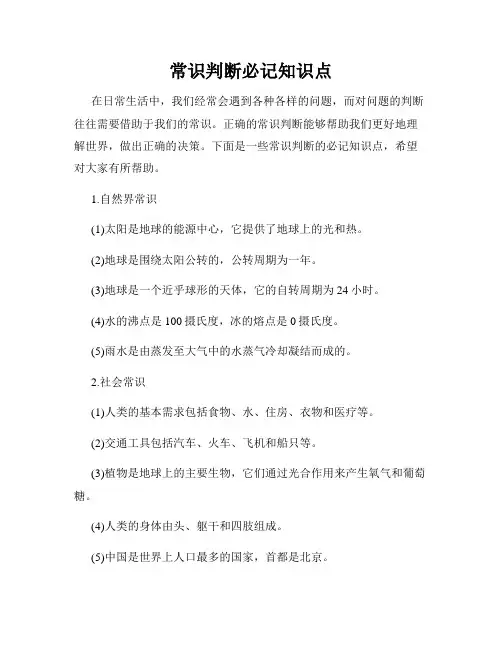
常识判断必记知识点在日常生活中,我们经常会遇到各种各样的问题,而对问题的判断往往需要借助于我们的常识。
正确的常识判断能够帮助我们更好地理解世界,做出正确的决策。
下面是一些常识判断的必记知识点,希望对大家有所帮助。
1.自然界常识(1)太阳是地球的能源中心,它提供了地球上的光和热。
(2)地球是围绕太阳公转的,公转周期为一年。
(3)地球是一个近乎球形的天体,它的自转周期为24小时。
(4)水的沸点是100摄氏度,冰的熔点是0摄氏度。
(5)雨水是由蒸发至大气中的水蒸气冷却凝结而成的。
2.社会常识(1)人类的基本需求包括食物、水、住房、衣物和医疗等。
(2)交通工具包括汽车、火车、飞机和船只等。
(3)植物是地球上的主要生物,它们通过光合作用来产生氧气和葡萄糖。
(4)人类的身体由头、躯干和四肢组成。
(5)中国是世界上人口最多的国家,首都是北京。
3.科学常识(1)牛奶中含有丰富的钙,鱼肉富含蛋白质。
(2)植物通过根部吸收水分和养分,通过叶子进行光合作用。
(3)地球上的金字塔包括埃及的金字塔和墨西哥的玛雅金字塔。
(4)照相机是通过镜头捕捉光线,并通过电子器件将光线转换为图像。
(5)手机是通过无线电波进行通信的。
4.历史常识(1)中国的四大发明包括造纸术、印刷术、火药和指南针。
(2)二战是20世纪最具规模和影响力的战争之一,参战国包括德国、日本、美国和苏联等。
(3)美国是世界上第一次使用核武器的国家,分别在日本广岛和长崎投下了两颗原子弹。
(4)中国共产党成立于1921年,中国的现任主席是习近平。
(5)世界上最古老的七大奇迹之一是埃及的金字塔。
以上就是常识判断的一些必记知识点,希望这些知识点能够帮助大家更好地认识世界,提高自己的常识水平。
每个人都应该具备一定的常识判断能力,这不仅有助于解决问题,还能够提高我们的思维能力和观察力。
通过不断学习和积累,我们可以不断拓宽自己的知识面,做出更准确的判断。
让我们共同努力,成为一个有常识的人。
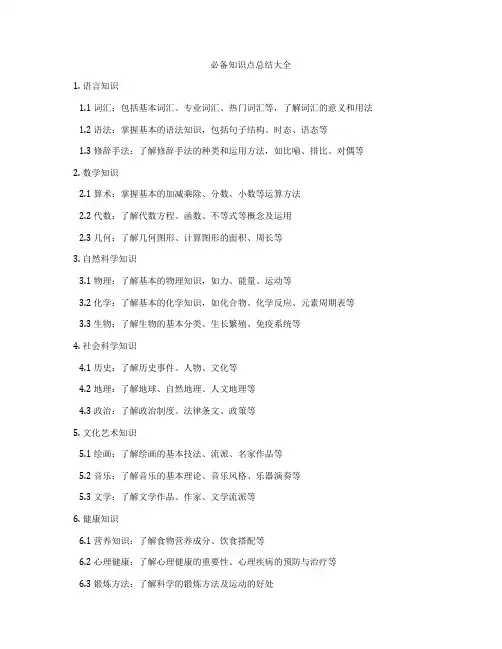
必备知识点总结大全1. 语言知识1.1 词汇:包括基本词汇、专业词汇、热门词汇等,了解词汇的意义和用法 1.2 语法:掌握基本的语法知识,包括句子结构、时态、语态等1.3 修辞手法:了解修辞手法的种类和运用方法,如比喻、排比、对偶等2. 数学知识2.1 算术:掌握基本的加减乘除、分数、小数等运算方法2.2 代数:了解代数方程、函数、不等式等概念及运用2.3 几何:了解几何图形、计算图形的面积、周长等3. 自然科学知识3.1 物理:了解基本的物理知识,如力、能量、运动等3.2 化学:了解基本的化学知识,如化合物、化学反应、元素周期表等3.3 生物:了解生物的基本分类、生长繁殖、免疫系统等4. 社会科学知识4.1 历史:了解历史事件、人物、文化等4.2 地理:了解地球、自然地理、人文地理等4.3 政治:了解政治制度、法律条文、政策等5. 文化艺术知识5.1 绘画:了解绘画的基本技法、流派、名家作品等5.2 音乐:了解音乐的基本理论、音乐风格、乐器演奏等5.3 文学:了解文学作品、作家、文学流派等6. 健康知识6.1 营养知识:了解食物营养成分、饮食搭配等6.2 心理健康:了解心理健康的重要性、心理疾病的预防与治疗等6.3 锻炼方法:了解科学的锻炼方法及运动的好处7. 科技知识7.1 信息技术:了解计算机基本操作知识、网络原理、办公软件等7.2 通讯技术:了解手机、电视、网络等通讯工具的使用7.3 新能源技术:了解太阳能、风能、水能等新能源的利用与发展8. 生活常识8.1 饮食:了解健康饮食、饮食禁忌、食品安全等8.2 家庭生活:了解家庭关系处理、家居装饰、生活常备药等8.3 社交礼仪:了解社交礼仪、职场礼仪、宴会礼仪等9. 环境保护知识9.1 节能减排:了解节能减排的重要性和方法9.2 废物处理:了解废物分类与处理方法9.3 自然灾害:了解自然灾害的种类、预防措施等10. 外语知识10.1 英语:了解英语的基本语法、词汇、阅读、写作等10.2 日语、法语、德语等:了解其他外语的基本知识,包括语法、词汇等以上就是必备知识点的总结,希望对您有所帮助。
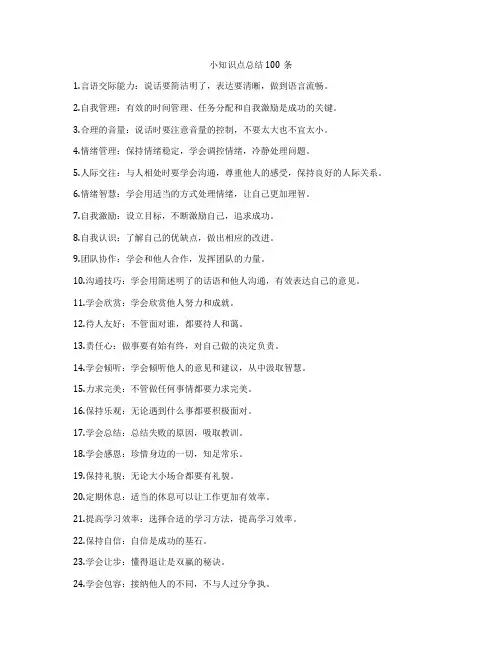
小知识点总结100条1.言语交际能力:说话要简洁明了,表达要清晰,做到语言流畅。
2.自我管理:有效的时间管理、任务分配和自我激励是成功的关键。
3.合理的音量:说话时要注意音量的控制,不要太大也不宜太小。
4.情绪管理:保持情绪稳定,学会调控情绪,冷静处理问题。
5.人际交往:与人相处时要学会沟通,尊重他人的感受,保持良好的人际关系。
6.情绪智慧:学会用适当的方式处理情绪,让自己更加理智。
7.自我激励:设立目标,不断激励自己,追求成功。
8.自我认识:了解自己的优缺点,做出相应的改进。
9.团队协作:学会和他人合作,发挥团队的力量。
10.沟通技巧:学会用简述明了的话语和他人沟通,有效表达自己的意见。
11.学会欣赏:学会欣赏他人努力和成就。
12.待人友好:不管面对谁,都要待人和蔼。
13.责任心:做事要有始有终,对自己做的决定负责。
14.学会倾听:学会倾听他人的意见和建议,从中汲取智慧。
15.力求完美:不管做任何事情都要力求完美。
16.保持乐观:无论遇到什么事都要积极面对。
17.学会总结:总结失败的原因,吸取教训。
18.学会感恩:珍惜身边的一切,知足常乐。
19.保持礼貌:无论大小场合都要有礼貌。
20.定期休息:适当的休息可以让工作更加有效率。
21.提高学习效率:选择合适的学习方法,提高学习效率。
22.保持自信:自信是成功的基石。
23.学会让步:懂得退让是双赢的秘诀。
24.学会包容:接纳他人的不同,不与人过分争执。
25.度量大心胸:对他人的批评和责备要有度量和胸襟。
26.表达自己:学会表达自己的观点和看法。
27.提升思维:拓展思维,多角度思考问题。
28.培养兴趣爱好:寻找自己的兴趣爱好,丰富自己的生活。
29.互相尊重:尊重他人是基本礼仪。
30.建立良好的生活习惯:不断养成良好的生活习惯。
31.学会拒绝:适当的拒绝他人的要求。
32.处理压力:学会处理压力,不被压力所制。
33.学会安排时间:合理安排时间、提高效率。
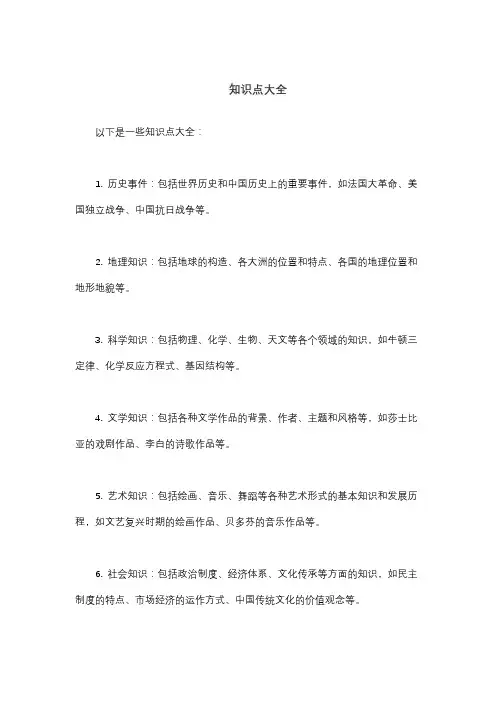
知识点大全
以下是一些知识点大全:
1. 历史事件:包括世界历史和中国历史上的重要事件,如法国大革命、美国独立战争、中国抗日战争等。
2. 地理知识:包括地球的构造、各大洲的位置和特点、各国的地理位置和地形地貌等。
3. 科学知识:包括物理、化学、生物、天文等各个领域的知识,如牛顿三定律、化学反应方程式、基因结构等。
4. 文学知识:包括各种文学作品的背景、作者、主题和风格等,如莎士比亚的戏剧作品、李白的诗歌作品等。
5. 艺术知识:包括绘画、音乐、舞蹈等各种艺术形式的基本知识和发展历程,如文艺复兴时期的绘画作品、贝多芬的音乐作品等。
6. 社会知识:包括政治制度、经济体系、文化传承等方面的知识,如民主制度的特点、市场经济的运作方式、中国传统文化的价值观念等。
7. 体育知识:包括各种体育项目的规则、技巧和发展历程,如足球比赛的规则、篮球运动的技巧等。
8. 健康知识:包括保持身体健康的方法和预防疾病的措施,如均衡饮食的原则、运动对身体健康的好处等。
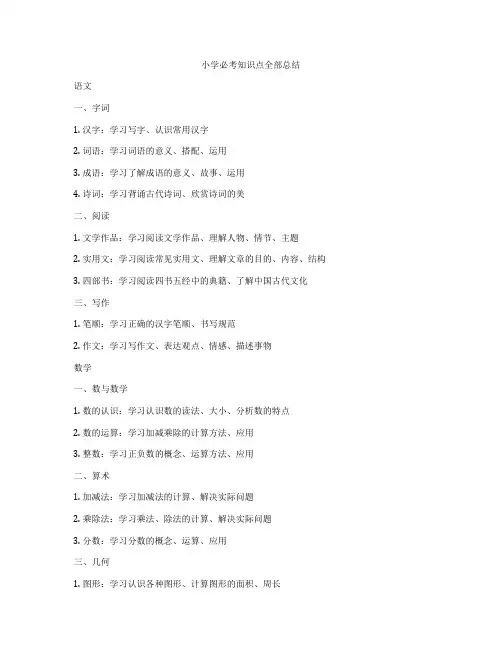
小学必考知识点全部总结语文一、字词1. 汉字:学习写字、认识常用汉字2. 词语:学习词语的意义、搭配、运用3. 成语:学习了解成语的意义、故事、运用4. 诗词:学习背诵古代诗词、欣赏诗词的美二、阅读1. 文学作品:学习阅读文学作品、理解人物、情节、主题2. 实用文:学习阅读常见实用文、理解文章的目的、内容、结构3. 四部书:学习阅读四书五经中的典籍、了解中国古代文化三、写作1. 笔顺:学习正确的汉字笔顺、书写规范2. 作文:学习写作文、表达观点、情感、描述事物数学一、数与数学1. 数的认识:学习认识数的读法、大小、分析数的特点2. 数的运算:学习加减乘除的计算方法、应用3. 整数:学习正负数的概念、运算方法、应用二、算术1. 加减法:学习加减法的计算、解决实际问题2. 乘除法:学习乘法、除法的计算、解决实际问题3. 分数:学习分数的概念、运算、应用三、几何1. 图形:学习认识各种图形、计算图形的面积、周长2. 角:学习认识角的概念、度量、分类3. 三角形:学习三角形的性质、计算三角形的面积四、代数1. 代数式:学习认识代数式、进行代数计算2. 方程解:学习解一元一次方程、应用方程解实际问题自然科学一、物质1. 自然界物质:学习认识水、空气、土壤等自然物质、了解其特点、用途2. 物质的变化:学习观察物质的物理变化、化学变化3. 物质的组成:学习认识物质的组成、原子、分子二、生物1. 动植物:学习认识各种植物、动物、了解其习性、生活习性2. 人体:学习认识人体各器官、功能、保养健康3. 繁殖:学习生物的繁殖方式、繁殖特点三、地理1. 大地理环境:学习认识地球、大陆、海洋、大气、了解其作用、分布2. 地理现象:学习认识自然现象、地理景观、地球运动3. 人文地理:学习认识人类活动、自然环境的关系、了解地理知识的应用四、天文1. 天体运行:学习认识太阳、月亮、地球等天体的运动规律2. 星座:学习认识星座排列、星座的变化、星座的名字3. 天文现象:学习认识日月食、星座移位、天体碰撞等现象社会科学一、历史1. 中国历史:学习中国古代历史、了解各个朝代的兴衰2. 世界历史:学习世界各国历史、了解各国文明的发展3. 历史事件:学习中国历史事件、世界历史事件、了解历史事件的影响二、地理1. 地理环境:学习中国各地理环境、了解各地区的自然地理2. 地理资源:学习地理资源的种类、分布、利用3. 地理信息:学习地理信息的获取、利用、了解地理信息的应用三、民族文化1. 民族:学习中国各民族的风俗、传统、文化2. 传统文化:学习中国传统文化、了解传统节日、传统习俗3. 文化遗产:学习了解中国的文化遗产、世界文化遗产四、政治1. 国家制度:学习国家的政治制度、了解国家的运行机制2. 政治权利:学习公民的政治权利、了解公民的政治责任3. 法律法规:学习法律法规的内容、遵守法律法规以上是小学必考知识点的总结,希望对大家的学习有所帮助。
知识点是什么意思知识点,顾名思义,是指知识的点滴集合,是在特定领域或主题下的一个具体知识要点或知识要素,用于说明或归纳某个主题或领域内的基本概念、原则、规律、技巧等。
在教育、学习和研究过程中,知识点是帮助学生理解和掌握知识的基本单位,是学习和教学的重要组成部分。
一、知识点的分类和特点1. 知识点的分类知识点可以按照学科或领域进行分类,如数学、物理、化学、语文、英语等。
不同学科或领域的知识点内容和特点各不相同,需要学习者根据实际需求进行选择和学习。
2. 知识点的特点(1)明确性:知识点应该具有明确的表达和定义,能够清晰地传递给学习者,使其能够准确理解和掌握。
(2)独立性:每个知识点应该是相对独立的,具有自身独特的概念和特点,不与其他知识点混淆。
(3)组织性:知识点之间应该有一定的组织结构和联系,形成一个完整的知识体系,帮助学习者更好地理解和应用知识。
二、知识点的作用和意义1. 学习指导作用知识点是学习的基本单位,它们的明确性和独立性可以为学习者提供清晰的学习目标和方向,帮助他们更好地制定学习计划和进行学习安排。
2. 知识整合作用通过学习和掌握不同的知识点,学习者可以将这些知识点进行整合和归纳,形成一个全面的知识体系,提高学习效果和能力。
3. 理解深化作用在学习的过程中,学习者通过对知识点的分析和理解,可以加深对该领域或主题的理解和认识,提高对问题的解决能力和创新思维。
4. 输出应用作用通过学习和掌握知识点,学习者可以将其应用于实际生活和工作中,解决实际问题,提高工作效率和质量。
三、如何有效学习和掌握知识点1. 分清主次在学习过程中,应该将主要的、核心的知识点放在优先学习的位置,重点关注对关键知识点的理解和掌握。
2. 注重实践对于一些理论性的知识点,需要通过实际操作和实践来巩固和运用,掌握其具体应用场景和方法。
3. 多角度思考对于某个知识点,可以从不同的角度来进行思考和分析,提高对知识点的理解深度和广度。
什么叫知识点知识点,作为教育学、心理学、认知科学中的一种基本概念,指为获得一定领域内的知识而必要掌握的其中的某一个或者若干个概念、原则、方法或者技能等。
这些知识点是在一个特定的学科或者领域中,被广泛认可,有普遍性和重要性,在掌握该领域内的知识、技能、思维能力等方面起到至关重要的作用。
简单来说,知识点就是具有重要作用、具备一定广泛性的基础性概念和基本技能。
知识点的本质是构成知识的最基本单位,是教育教学工作中最基本、最重要的组成部分。
知识点的核心特点是凝练、简练、精通。
通过学习,人们逐渐建立起一定领域知识的体系,确定其中的核心概念和基本原理,这些基本概念、基本原理统称为知识点。
知识点是学习的基石,也是测验学生掌握情况的基础。
知识点是学习者在特定领域学习和掌握知识的关键信息单元。
它主要包括基本概念、重要原理、核心思想、基本规律、基本方法、基本技能和实践经验等。
对于学习者来说,知识点是获取知识、掌握技能的重要依据,也是进行探究、创新的基础。
知识点的级别是不同的,有的知识点属于基础性的,比如四则运算、拼音、英语单词等;有的知识点则是高级或者进阶性的,比如微积分、操作系统、法律法规等。
学习者需要从基础开始逐步掌握各个层次的知识点,从而建立起完备、稳固的知识结构。
知识点的学习方法也是多样的。
学习者可以通过阅读教材、参加课堂学习、进行课外探究、完成作业和练习等多种途径学习和掌握知识点。
在学习和掌握知识点时,学习者需要注意以下几点:一是建立知识点的概念体系,梳理知识点之间的联系和关系;二是强调知识点的实践应用,注重知识点的学习和实际运用的有机结合;三是重视知识点的贯通性,将不同知识点进行整合,形成有机的知识体系。
总之,知识点作为学习某个领域知识的基础单元,是学习、考试、评价等教育教学工作中最基本、最重要的组成部分。
掌握好知识点,不仅可以深入了解学科本身,还能够启发学习者的思维,帮助他们探索和解决问题。
因此,学习者在学习、掌握知识点时,一定要注重梳理、理解和实践,以真正掌握知识点的精髓和实际应用。
1、世界上最大的淡水湖答案:苏必利尔湖2、98年世界杯谁是冠军?答案:以上都不对3、世界上最大的热带雨林分布在答案:非洲4、摩尼教宣传什么学说?答案:善恶二元论5、中国现存最古老的藏书阁在哪里?答案:宁波6、道路交通管理条例中所称的道路是指:答案:公路、城镇街道和胡同、公共广场、停车场等7、佛教产生于哪里?答案:喜马拉雅山脚8、少量饮酒对身体有好处,请问下列哪种酒对心血管疾病有预防作用答案:葡萄酒9、离太阳最远的行星答案:冥王星10、谁是NBA2002-2003赛季最佳新秀答案:斯塔得麦尔11、漫画<机器猫叮噹>的作者滕子?不二雄是两个人吗?答案:是12、以下哪项没有设诺贝尔奖?答案:数学13、windows是哪个公司的产品?答案:Microsoft14、明月几时有?把酒问青天。
是谁的词?答案:苏轼15、塑料可以电镀吗?答案:可以16、“赔了夫人又折兵”中的“夫人”指的是:答案:孙权的妹妹17、中国大陆第一篇被改编为科幻电影的科幻小说是:答案:《珊瑚岛上的死光》18、北京将举办哪届奥运会?答案:200819、谁被誉为中国的“莎士比亚”?答案:关汉卿20、中国大陆科幻作者中获得银河奖首奖最多的一位作者是:答案:王晋康21、哪一位画家对二十世纪几何抽象艺术有很大的影响?答案:乔治?修拉22、花露水越陈越香吗?答案:是23、电影<<魂断蓝桥>>是以哪座城市为背景?答案:伦敦24、希腊神话中除了宙斯以外最尊贵的神是:答案:波赛顿25、鲁迅的<狂人日记>第一次发表在哪一本刊物上?答案:新青年26、在商场购物,能否向商场要增值税发票:答案:不能27、在中文Windows的输入中文标点符号状态下,按下列什么键可以输入中文标点符号顿号答案:\28、南京栖霞寺现存建筑为何朝所建:答案:清朝29、国有独资公司设经理,经理由谁聘任或解聘答案:董事会30、世界上最早的纸币出现在我国宋朝.其名称是?答案:交子31、姚明在NBA的哪个队打篮球答案:火箭32、1978年国际象棋冠军赛在哪国举行?答案:菲律宾33、数码相机的像素越高,则拍出的照片:答案:越大34、蓝牙技术是一项无线电技术其传输范围在:答案:10米左右35、你知道龙井茶的产地吗?答案:浙江杭州36、世界上第一个将科幻文学引入大学教育的是一位美国著名科幻活动家,他的名字是:答案:莫兹考维茨37、什么时候是最佳记忆时刻?答案:6至7点38、如果电脑中数据已删除或破坏能否找回答案:可以39、南朝历代排序:答案:宋齐梁陈40、下面哪位科学家是瑞典的?答案:诺贝尔41、夜郎自大中“夜郎”指的是现在哪个地方?答案:贵州42、鱼会筑巢吗:答案:会43、中国大陆第一篇在国际获奖的科幻小说是:答案:《火星建设者》44、圈地运动发生下面哪个国家?答案:英国45、并联电路的总电阻的倒数等于答案:各并联电阻的倒数之和46、卡夫卡来自哪个国家?答案:奥地利47、目前世界第一高楼位于答案:马来西亚48、对于Windows的图标文件有大图标和小图标之分,请问大图标的尺寸是多少答案:32×3249、哪个作家塑造了唐吉诃德这个形象?答案:塞万提斯50、经研究发现,延寿效果最为显著的是答案:红茶科目四考试网/st/jq/科目四考试技巧51、我国刑法规定那类人犯罪应当负相对刑事责?答案:已满14周岁不满16周岁52、被希特勒誉为德国海军的骄傲的战列舰是:答案:俾斯麦号53、艾滋病的主要传播途径是:答案:血液54、历史上被尊称为草圣的书法家是答案:张芝55、中国茅台酒是创于答案:1704年56、东欧剧变从哪个国家最先爆发?答案:波兰57、撞击太阳的彗星是不是同一各家族的答案:是58、我国现行的第五套人民币的面值共有多少种?答案:8种59、国际奥委会设主席一人,副主席几人答案:360、日伪时期亚洲最大的电厂在哪里?答案:中国61、范进中举出自答案:《儒林外史》62、我们讲创作客体是指答案:社会生活63、以下哪一种观点是弗洛伊德在《梦的解析》中的主要观点?答案:梦是愿望的达成64、防止近亲结婚的原因是:答案:防止先天遗传病65、在分子生物学中,PCR是以下哪种反应的英文简称?答案:聚合酶链式反应66、反对袁世凯称帝的护法战争是谁发起的?答案:孙中山67、第一宇宙速度有多么快答案:7.9千米/秒68、熬猪油前应该先放点:答案:水69、古书中男子手里常握有三尺,请问它指什么?答案:剑70、电波是物质吗答案:是71、描述月亮圆缺变化的最后阶段是上弦月还是残月?答案:残月72、发烧病人不宜喝下面哪种饮料答案:浓茶水73、1海里等于多少米?答案:1852米74、动物学家把哪些动物称作厚皮动物:答案:野牛、犀牛75、“司马”一词在我国古代原是指:答案:官名76、保加利亚的国花是:答案:玫瑰77、俄罗斯文学之父是谁?答案:普希金78、世界上绝大多数国家的国旗的形状为矩形,但下面所列国家中有一个国家的国旗却不是,它是:答案:亚洲的尼泊尔79、著名的Flash作品〈新长征路上的摇滚〉是谁的作品?答案:老蒋80、非洲产量和储量都占世界第一位的矿产是答案:黄金、金刚石81、我国的少数民族众多,各民族又按照本族的特点和习俗分为不同的支系,其中傣族分为三支:_________傣、旱傣和花腰傣。
各学科知识点大全总结1. 代数学:代数运算、方程组、不等式、函数、变量、常数等。
2. 几何学:平面几何、立体几何、角度、长度、面积、体积等。
3. 数论:素数、因数分解、最大公因数、最小公倍数等。
4. 概率论:概率公式、条件概率、独立事件、互斥事件、随机变量等。
5. 统计学:样本、总体、统计量、抽样、参数估计、假设检验等。
物理:1. 力学:牛顿三定律、作用力、摩擦力、弹力、重力等。
2. 热学:温度、热量、热力学定律、热传导、热辐射等。
3. 光学:光的传播、反射、折射、光的色散、光的偏振等。
4. 电磁学:静电场、电荷、电场、电流、电磁感应、电磁波等。
化学:1. 元素周期表:元素的分类、周期性规律、元素的性质等。
2. 化学键:离子键、共价键、金属键、分子间力等。
3. 反应速率:化学动力学、反应速度、速率常数、反应机理等。
4. 化学平衡:化学平衡常数、平衡常数的影响因素、平衡移动等。
5. 化学反应:酸碱中和、氧化还原、置换反应、双替反应等。
生物学:1. 细胞生物学:细胞的结构、功能、代谢、生命活动等。
2. 遗传学:基因的表达、遗传信息的传递、遗传变异、突变等。
3. 生态学:生态系统、生物多样性、生态位、食物链、能量流等。
4. 植物学:植物的分类、结构、生长发育、植物生理等。
5. 动物学:动物的分类、解剖、生殖、行为、进化等。
地理学:1. 自然地理:地形地貌、水文地理、气候气象、土壤地理等。
2. 人文地理:人口地理、城市地理、经济地理、政治地理等。
3. 地球科学:地球内部结构、地壳运动、地震、火山等。
4. 地图学:地图投影、地图符号、地图比例尺、地图制图等。
历史:1. 世界历史:古代世界史、中世纪史、近代史、现代史等。
2. 中国历史:夏商周、秦汉、三国、南北朝、隋唐、宋元明清等。
3. 政治史:政权更迭、政治思想、政治体制、政治运动等。
4. 文化史:文化传承、文化碰撞、文化交流等。
政治:1. 国家政治制度:宪法、立法、行政、司法、军事等。
初中常识知识点大全集一、数学知识点1. 整数和有理数整数的概念和性质,绝对值的概念和性质;有理数的概念和性质,有理数的四则运算规则。
2. 分数和小数分数的概念和性质,分数的四则运算规则;小数的概念和性质,小数的读法和写法。
3. 平面图形平行线、垂线、相交线的特点和判定方法;各种平面图形的性质和计算方法,如三角形、四边形、圆等。
4. 线性方程和不等式一元一次方程和不等式的概念和解法;两个一元一次方程的联立和解法。
5. 数据统计调查和统计的基本方法;频数、频率、众数、中位数、平均数等概念。
二、物理知识点1. 力与运动力的概念和分类,力的作用效果;运动的概念和运动状态,匀速直线运动的计算公式。
2. 光学与声学光的传播路径和光的反射定律;声音的传播和声音的频率、振动数等概念。
3. 电学知识电流和电压的概念,电阻的概念和作用;简单电路的搭建和计算。
4. 热学知识温度的概念,温度计的读数和转换;热传导、热对流和热辐射的基本特点。
5. 动力学牛顿第一、第二、第三定律的概念和应用;动量的概念和计算。
三、化学知识点1. 物质与反应物质的分类和物质的性质;化学反应的概念和常见反应类型。
2. 元素与化合物元素的概念和元素的周期表分类;化合物的概念和化合物的命名法则。
3. 酸碱与盐酸的定义、性质和酸碱指示剂的作用;碱的定义、性质和常见的碱。
4. 金属与非金属金属的性质和金属的应用;非金属的性质和非金属的应用。
5. 化学方程式化学方程式的写法和平衡化学方程式;化学方程式的应用。
四、生物知识点1. 细胞与组织细胞的结构和功能;人体的组织构成和器官功能。
2. 植物与动物常见的植物和动物的特点和分类;植物的繁殖方式和动物的生活习性。
3. 生物遗传遗传的基本规律和遗传的分子基础;遗传的应用和基因工程的原理。
4. 环境与生态环境的概念和环境对生物的影响;生物的适应性和生态系统的特点。
5. 人体健康健康的概念和保持身体健康的方法;常见疾病的预防和治疗方法。
初一英语知识点汇总一、词法1、名词A)、名词的数我们知道名词可以分为可数名词和不可数名词,而不可数名词它没有复数形式,但可数名词却有单数和复数之分,复数的构成如下:一)在后面加s。
如:fathers, books, Americans, Germans,apples, bananas二)x,sh, ch, s, ch后加es。
如:boxes,glasses, dresses, watches, wishes, faxes三)1)以辅音字母加y结尾的变y为i再加es如:baby-babies, family-families,duty-duties, comedy-comedies, documentary-documentaries, story-stories2)以元音字母加y结尾的直接加s。
如:day-days,boy-boys, toy-toys, key-keys, ways四)以o结尾加s(外来词)。
如:radios, photos, 但如是辅音加o的加es:如: tomatoes西红柿, potatoes马铃薯五)以f或fe结尾的变f为v再加es(s)。
如:knife-knives, wife-wives,half-halves, shelf-shelves, leaf-leaves, yourself-yourselves六)单复数相同(不变的)有:fish, sheep, deer鹿子, Chinese, Japanese七)一般只有复数,没有单数的有:people, pants, shorts, shoes, glasses, gloves, clothes, socks八)单词形式不变,既可以是单数也可以是复数的有:police警察局,警察, class班,同学, family家,家庭成员九)合成的复数一般只加主要名词,多数为后一个单词。
如:action movie-action movies, pen pal-pen pals; 但如果是由man或woman所组成的合成词的复数则同时为复数。
如:man doctor-men doctors, woman teacher-women teachers十)有的单复数意思不同。
如:fish鱼fishes鱼的种类,paper纸papers报纸,卷子,论文, work工作works作品,工厂, glass玻璃glasses玻璃杯,眼镜,orange桔子水oranges橙子, light 光线lights灯, people人peoples民族,time时间times时代, 次数, chicken 鸡肉chickens小鸡十一) 单个字母的复数可以有两种形式直接加s或‘s。
如:Is (I‘s), Ks (K‘s)。
但如是缩略词则只加s。
如:IDs, VCDs, SARs十二) 特殊形式的有:child-children, man-men, woman-women, foot-feet,mouse-mice,policeman-policemen, Englishman-EnglishmenB)名词的格当我们要表示某人的什么东西或人时,我们就要使用所有格形式。
构成如下:一)单数在后面加‘s。
如:brother‘s, Mike‘s, teacher‘s二)复数以s结尾的直接在s后加‘,如果不是以s结尾的与单数一样处理。
如:Teachers‘ Day教师节,classmates‘; Children‘s Day六一节, Women‘s Day三八节三)由and并列的名词所有时,如果是共同所有同一人或物时,只加最后一个‘s,但分别拥有时却分别按单数形式处理。
如:Mike and Ben‘s room迈克和本的房间(共住一间),Mike‘s and Ben‘s rooms迈克和本的房间(各自的房间)2、代词项目人称代词物主代词指示代词反身代词人称主格宾格形容词名词性第一人称单数I me my mine myself复数we us our ours ourselves第二人称单数you you your yours yourself复数you you your yours yourselves第三人称单数she her her hers herselfhe him his his himselfit it its its this that itself复数they them their theirs these thosethemselves3、动词A)第三人称单数当动词是第三人称单数时,动词应该像名词的单数变动词那样加s,如下:一)一般在词后加s。
如:comes, spells, waits, talks, sees,dances, trains二)在x,sh, ch, s, tch后加es。
如:watches,washes, wishes, finishes三)1)以辅音字母加y结尾的变y为i再加es。
如:study-studies, hurry-hurries, try-tries2)以元音字母加y结尾的直接加s。
如:plays, says, stays, enjoys, buys四)以o结尾加es。
如:does, goes五)特殊的有:are-is, have-hasB)现在分词当我们说某人正在做什么事时,动词要使用分词形式,不能用原形,构成如下:一)一般在后加ing。
如:spell-spelling, sing-singing,see-seeing, train-training, play-playing, hurry-hurrying, watch-watching,go-going, do-doing二)以不发音e的结尾的去掉e再加ing。
如:dance-dancing, wake-waking, take-taking, practice-practicing,write-writing, have-having三)以重读闭音节结尾且一个元音字母+一个辅音字母(注意除开字母组合如show–showing, draw-drawing)要双写最后的辅音字母再加ing。
如:put-putting, run-running,get-getting,let-letting, begin-beginning四)以ie结尾的变ie为y再加ing。
如:tie-tying系die-dying死lie-lying 位于4、形容词的级我们在对两个或以上的人或物进行对比时,则要使用比较或最高级形式。
构成如下:一) 一般在词后加er或est(如果是以e结尾则直接加r或st)。
如:greater-greatest,shorter –shortest, taller –tallest,longer –longest, nicer- nicest, larger -largest二)以重读闭音节结尾且1个元音字母+1个辅音字母(字母组合除外,如few-fewer fewest)结尾的双写结尾的辅音再加er /est。
如:big-bigger biggest, red-redder reddest, hot-hotter hottest三) 以辅音字母+y结尾的变y为i加er/est。
如:happy-happier happiest,sorry-sorrier sorriest, friendly-friendlier friendliest(more friendly mostfriendly), busy-busier busiest, easy-easier easiest四)特殊情况:(两好多坏,一少老远)good/well -better best many/much - more most bad/ill– worse worstlittle- lessleast old- older/elder oldest/eldest far- farther/further farthest/furthest5、数词(基变序,有规则;一、二、三,自己背;五、八、九、十二;其它后接th;y结尾,变为i, eth跟上去。
)first, second, third; fifth, eighth, ninth, twelfth; seventh, tenth,thirteenth, hundredth; twenty-twentieth, forty-fortieth, ninety-ninetiethagree with sb 同意某人的看法agree on sth 同意某事arrive at/in sp 到达某地ask sb to do sth 叫某人做某事ask sb not to do sth 叫某人不要做某事be interested in sth 对某事感兴趣be busy doing/with sth忙于做某事be strict in sth 对某事要求严格be strict with sb 对某人要求严格decide to do sth 决定做某事dislike doing sth 不喜欢做某事enjoy doing sth 喜欢做某事find sb do/doing sth 发现某人做某事finish doing sth 完成某事give sb sth 给某人某物give sth to sb 给某人某物have fun doing sth 做…很有趣help sb with sth 帮助某人某事help sb (to) do sth 帮助某人做某事help sb sth=help sth to sb it‘s time for sth 该做某事了it‘s time for sb to do sth 该某人做某事了it‘s time to do sth 该做某事了like doing/to do sth 喜欢做某事make sb do sth 让某人做某事mind (sb) doing sth 介意(某人)做某事pass sb sth 把某物递给某人pass sth to sb 把某物递给某人practice doing sth 练习做某事remember doing sth 记得做过某事remember to do sth 记得要做某事see sb do/doing sth 看见某人做某事show sb sth 给某人看某物show sth to sb 给某人看某物spend…(in) doing sth 花费…做某事spend…on sth 花费…在某物上start doing sth 开始做某事start to do sth 开始做某事stop doing sth 停止做某事stop to do sth 停下来再做某事talk about sth 谈论某事talk to/with sb 与某人交谈tell sb about sth 告诉某人关于某事tell sb to do sth 告诉某人做某事tell sb not to do sth 告诉某人不要做某事want sth 想要某物want to do sth 想要做某事want sb to do sth 想要某人做某事watch sb do/doing sth 看见某人做某事wish to do sth 希望做某事would like to do sth 想要做某事㈠短语总结1. 在学校大门口at the school gate2. 来学校come to school3. 去学校go to school4. 上课have class / have classes5. 步行on foot6. 骑自行车ride a bike/ ride bikes/ by bike / on a bike7. 坐公交by bus / take a bus8. 坐地铁by subway / take the subway / on the subway9. 坐飞机by plane/ take the plane / on the plane10. 坐小汽车by car / in a car/ take a car/ drive a car11. 坐轮船by ship12. 坐小船by boat13. 坐火车by train / on the train14. 在我们组in our group15. 一群学生 a group of students16. 我们中的三个人three of us17. 在平日on weekdays18. 在周末on the weekends / at weekends19. 起床get up20. 睡觉go to bed21. 早起get up early22. 回家go home23. 到家get home24. 去动物园go to the zoo25. 去公园go to the park26. 看电影see a movie / film27. 看电视watch TV28. 在晚上in the evening / at night29. 帮助父母help parents30. 做某人的家庭作业do one‘s ( my/ her/ his/ your/ their)homework31. 在学校at school 32. 知道,了解know about / learn about33. 校园生活school life34. 一个美国学生an American student35. 在美国in America / in the U.S.A.36. 许多学生many students/ a lot of students/ lots of students37. 很少very few38. 吃午饭have lunch39. 出去吃饭eat out40. 在校期间on school days41. 休息一会have a short rest/ break42. 午饭后after lunch43. 在某人的业余时间in one‘s ( my/ his/ her/ their…)free/ spare time44. 打篮球play basketball45. 踢足球play soccer / football46. 弹钢琴play the piano47. 弹吉他play the guitar48. 拉二胡play erhu49. 去游泳go swimming / go for a swim50. 去划船go boating51. 球赛a ball game / ball games52. 一年四次four times a year53. 听音乐listen to music54. 读书read books55. 看报read newspapers56. 看医生see a doctor57. 去图书馆go to the library58. 一周两次twice a week59. 见朋友meet friends60. 每天every day61. 在七点半at half past seven62. 一小会for a little while / for a short time63. 晚饭后after supper64. 吃饭have dinner65. 吃早饭have breakfast㈡重要句型1. I usually come to school by subway.同义句: I usually take the subway to school.对划线部分提问: How do you usually come to school?类似的有:go to school by bike=go to schoolon a bike= ride a bike to school=ride to schoolgo home by bus=go home on a bus=take a bus home2. How do you usually/ often…?你通常/经常怎样…?3. It‘s time for class.=It‘s time to have class. =It‘s time for having class.4. What about you? =How about you?5. How often …? 询问频率,回答可以用频率副词:always, usually, often, sometimes, seldom, never, every day ,every +其他时间名词或表示频率的短语回答表示频率的短语:次数+单位时间e.g. : once a day / twice a week / three times a month6. The early bird catches the work. (谚语) 笨鸟先飞7. Work / Study must come first. 工作/ 学习必须放在第一位!8. Classes begin at eight. =Class begins at eight.提问:What time does the class begin? / What time do the classes begin?㈢重要单词的用法1. look (感官动词) 看起来,后面加形容词His mother looks very young.They look very cute.Her dress looks very nice.You look very cool in this coat.2. by 介词by 后面直接加表示交通工具的名词,中间不用任何词修饰,如:by bikeby +动词ing形式,表示通过某种方式People show love to their mothers by giving cards.You can be a good student by working hard.3. over (形容词)School / Class is over.4. begin现在分词: beginning 过去式: beganbegin to do sth , begin doing sthHe begins to write a letter. =He begins writing a letter.如果begin本身为分词,只能用begin to do sthHe is beginning to run.5. listen to 听(动作),hear 听见(结果)6. always 反义词never7. 本话题涉及的时态为一般现在时,句中常有频率副词或表示频率的短语,如果主语为三单,动词一定要用三单!(四)易错题1. You new watch ______ (look) very nice!2. Here ______(be) some news.3. Oh, come on! It‘s time_____ going to school.4. They usually go to school on ________(feet).5. In my class, forty of _______(we) go to school by bike.6. The early bird ______ (catch) the worm.7. Kangkang often _____ (ride) a bike to the park.8. What time _____ (be)school over?9. Work must come ______(once).10. It‘s time ____y ou to get up.11. We often _____ books in the morning.12. Jill‘s friend like ______(study) in our school.13. Mr. Wang teaches ______(we) English. _____ of us like him.14. How about ______(go) out with me? 15. Most students go to school _____ the school bus.16. _______ do you go shopping with your mother?A. How soonB. How farC. How oftenD. How much17. What time do you usually get up _____ weekdays?18. He ______ busy, so he has no time to play with us.A. is alwaysB. seldom isC. always isD. often is19. The last class______(finish) at twelve o‘clock.20. Let‘s go______(boat).21. It‘s time to have breakfast. (同义句)______________________________________________________.22. Michael often rides a bike to school. (同义句)______________________________________________________.23. I always go to work on foot. (对划线部分提问)______________________________________________________.24. My mother goes shopping twice a week. (对划线部分提问)______________________________________________________.25. Mary always reads books in the library. (反义句)______________________________________________________.26. He usually does his homework at school. (否定句)______________________________________________________.27. They often go to school by bus in the morning. (对划线部分提问) ______________________________________________________.28. Jane seldom watches TV on weekdays. (改为一般疑问句)______________________________________________________.29. He usually has lunch at home. (对划线部分提问)______________________________________________________.30. Li Ping often goes to work on foot. (同义句)______________________________________________________.31. 几乎没有学生乘地铁去学校。